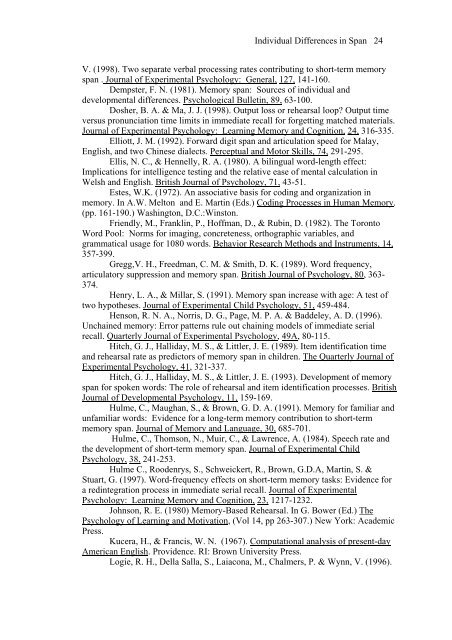Individual Differences in Span 1 Individual Differences in Memory ...
Individual Differences in Span 1 Individual Differences in Memory ...
Individual Differences in Span 1 Individual Differences in Memory ...
Create successful ePaper yourself
Turn your PDF publications into a flip-book with our unique Google optimized e-Paper software.
<strong>Individual</strong> <strong>Differences</strong> <strong>in</strong> <strong>Span</strong> 24<br />
V. (1998). Two separate verbal process<strong>in</strong>g rates contribut<strong>in</strong>g to short-term memory<br />
span . Journal of Experimental Psychology: General, 127, 141-160.<br />
Dempster, F. N. (1981). <strong>Memory</strong> span: Sources of <strong>in</strong>dividual and<br />
developmental differences. Psychological Bullet<strong>in</strong>, 89, 63-100.<br />
Dosher, B. A. & Ma, J. J. (1998). Output loss or rehearsal loop? Output time<br />
versus pronunciation time limits <strong>in</strong> immediate recall for forgett<strong>in</strong>g matched materials.<br />
Journal of Experimental Psychology: Learn<strong>in</strong>g <strong>Memory</strong> and Cognition, 24, 316-335.<br />
Elliott, J. M. (1992). Forward digit span and articulation speed for Malay,<br />
English, and two Ch<strong>in</strong>ese dialects. Perceptual and Motor Skills, 74, 291-295.<br />
Ellis, N. C., & Hennelly, R. A. (1980). A bil<strong>in</strong>gual word-length effect:<br />
Implications for <strong>in</strong>telligence test<strong>in</strong>g and the relative ease of mental calculation <strong>in</strong><br />
Welsh and English. British Journal of Psychology, 71, 43-51.<br />
Estes, W.K. (1972). An associative basis for cod<strong>in</strong>g and organization <strong>in</strong><br />
memory. In A.W. Melton and E. Mart<strong>in</strong> (Eds.) Cod<strong>in</strong>g Processes <strong>in</strong> Human <strong>Memory</strong>.<br />
(pp. 161-190.) Wash<strong>in</strong>gton, D.C.:W<strong>in</strong>ston.<br />
Friendly, M., Frankl<strong>in</strong>, P., Hoffman, D., & Rub<strong>in</strong>, D. (1982). The Toronto<br />
Word Pool: Norms for imag<strong>in</strong>g, concreteness, orthographic variables, and<br />
grammatical usage for 1080 words. Behavior Research Methods and Instruments, 14,<br />
357-399.<br />
Gregg,V. H., Freedman, C. M. & Smith, D. K. (1989). Word frequency,<br />
articulatory suppression and memory span. British Journal of Psychology, 80, 363-<br />
374.<br />
Henry, L. A., & Millar, S. (1991). <strong>Memory</strong> span <strong>in</strong>crease with age: A test of<br />
two hypotheses. Journal of Experimental Child Psychology, 51, 459-484.<br />
Henson, R. N. A., Norris, D. G., Page, M. P. A. & Baddeley, A. D. (1996).<br />
Uncha<strong>in</strong>ed memory: Error patterns rule out cha<strong>in</strong><strong>in</strong>g models of immediate serial<br />
recall. Quarterly Journal of Experimental Psychology, 49A, 80-115.<br />
Hitch, G. J., Halliday, M. S., & Littler, J. E. (1989). Item identification time<br />
and rehearsal rate as predictors of memory span <strong>in</strong> children. The Quarterly Journal of<br />
Experimental Psychology, 41, 321-337.<br />
Hitch, G. J., Halliday, M. S., & Littler, J. E. (1993). Development of memory<br />
span for spoken words: The role of rehearsal and item identification processes. British<br />
Journal of Developmental Psychology, 11, 159-169.<br />
Hulme, C., Maughan, S., & Brown, G. D. A. (1991). <strong>Memory</strong> for familiar and<br />
unfamiliar words: Evidence for a long-term memory contribution to short-term<br />
memory span. Journal of <strong>Memory</strong> and Language, 30, 685-701.<br />
Hulme, C., Thomson, N., Muir, C., & Lawrence, A. (1984). Speech rate and<br />
the development of short-term memory span. Journal of Experimental Child<br />
Psychology, 38, 241-253.<br />
Hulme C., Roodenrys, S., Schweickert, R., Brown, G.D.A, Mart<strong>in</strong>, S. &<br />
Stuart, G. (1997). Word-frequency effects on short-term memory tasks: Evidence for<br />
a red<strong>in</strong>tegration process <strong>in</strong> immediate serial recall. Journal of Experimental<br />
Psychology: Learn<strong>in</strong>g <strong>Memory</strong> and Cognition, 23, 1217-1232.<br />
Johnson, R. E. (1980) <strong>Memory</strong>-Based Rehearsal. In G. Bower (Ed.) The<br />
Psychology of Learn<strong>in</strong>g and Motivation, (Vol 14, pp 263-307.) New York: Academic<br />
Press.<br />
Kucera, H., & Francis, W. N. (1967). Computational analysis of present-day<br />
American English. Providence. RI: Brown University Press.<br />
Logie, R. H., Della Salla, S., Laiacona, M., Chalmers, P. & Wynn, V. (1996).
















